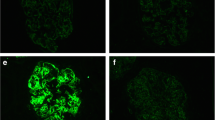Abstract
Proliferative glomerulonephritis with monoclonal immunoglobulin deposits (PGNMID) generally has a poor prognosis and the consensus is that it needs to be treated with clone-directed therapy. However, the prognosis of PGNMID is heterogenous and some cases have been successfully treated using other therapeutic strategies. We herein report a case of PGNMID that responded favorably to steroids without clone-directed therapy. An 18-year-old woman was referred to a nephrologist with proteinuria detected in an annual health check-up. Over a 3-year period, the concentration of creatinine (Cr) increased from 0.76 to 1.00 mg/dL and proteinuria from 0.35 to 1.9 g/g Cr. Monoclonal gammopathies were not detected in her serum or urine. Based on the findings of kidney biopsy at the age of 21 years, the patient was diagnosed with proliferative glomerulonephritis with monoclonal IgG1-kappa deposits. The histological feature was mesangial proliferative glomerulonephritis with advanced glomerulosclerosis, which is a rare presentation of PGNMID. Intravenous methylprednisolone pulse therapy was initiated, followed by oral prednisolone at a dose of 30 mg daily. One year later, a second kidney biopsy revealed a significant decrease in mesangial deposits of IgG1-kappa. Prednisolone was gradually tapered and discontinued 2 years after the first kidney biopsy. At the time of prednisolone withdrawal, urinalysis showed proteinuria of 0.2 g/g Cr without hematuria. Kidney function remained stable throughout the treatment period.



Similar content being viewed by others
References
Leung N, Bridoux F, Hutchison CA, Nasr SH, Cockwell P, Fermand JP, Dispenzieri A, Song KW, Kyle RA. International Kidney and Monoclonal Gammopathy Research Group. Monoclonal gammopathy of renal significance: when MGUS is no longer undetermined or insignificant. Blood. 2012;120:4292–5.
Nasr SH, Satoskar A, Markowitz GS, Valeri AM, Appel GB, Stokes MB, Nadasdy T, D’Agati VD. Proliferative glomerulonephritis with monoclonal IgG deposits. J Am Soc Nephrol. 2009;20:2055–64.
Leung N, Bridoux F, Batuman V, Chaidos A, Cockwell P, D’Agati VD, Dispenzieri A, Fervenza FC, Fermand JP, Gibbs S, Gillmore JD, Herrera GA, Jaccard A, Jevremovic D, Kastritis E, Kukreti V, Kyle RA, Lachmann HJ, Larsen CP, Ludwig H, Markowitz GS, Merlini G, Mollee P, Picken MM, Rajkumar VS, Royal V, Sanders PW, Sethi S, Venner CP, Voorhees PM, Wechalekar AD, Weiss BM, Nasr SH. The evaluation of monoclonal gammopathy of renal significance: a consensus report of the International Kidney and Monoclonal Gammopathy Research Group. Nat Rev Nephrol. 2019;15:45–59.
Gumber R, Cohen JB, Palmer MB, Kobrin SM, Vogl DT, Wasserstein AG, Nasta SD, Bleicher MB, Bloom RD, Dember L, Cohen A, Weiss BM, Hogan JJ. A clone-directed approach may improve diagnosis and treatment of proliferative glomerulonephritis with monoclonal immunoglobulin deposits. Kidney Int. 2018;94:199–205.
van Krujisdijk RCM, Abrahamas AC, Nguyen TQ, Minnema MC, Jacobs JFM, Limper M. Clone-directed therapy for proliferative glomerulonephritis with monoclonal immunoglobulin depositions: is it always necessary? Two case reports and literature review. J Nephrol. 2020;33:611–7.
Masai R, Wakui H, Komatsuda A, Togashi M, Maki N, Ohtani H, Oyama Y, Sawada K. Characteristics of proliferative glomerulo-nephritis with monoclonal IgG deposits associated with membranoproliferative features. Clin Nephrol. 2009;72:46–54.
Komatsuda A, Masai R, Ohtani H, Togashi M, Maki N, Sawada K, Wakui H. Monoclonal immunoglobulin deposition disease associated with membranous features. Nephrol Dial Transplant. 2008;23:3888–94.
Ohashi R, Sakai Y, Otsuka T, Ohno D, Masuda Y, Murasawa T, Sato N, Shimizu A. Proliferative glomerulonephritis with monoclonal IgG2κ deposit successfully treated with steroids: a case report and review of the literature. CEN Case Rep. 2013;2:197–203.
Komatsuda A, Wakui H, Ohtani H, Niumura T, Sawada K. Steroid-responsive nephrotic syndrome in a patient with proliferative glomerulonephritis with monoclonal IgG deposits with pure mesangial proliferative features. NDT Plus. 2010;3:357–9.
Fujiwara T, Komatsuda A, Ohtani H, Togashi M, Sawada K, Wakui H. Proliferative glomerulonephritis with monoclonal IgG deposits in a patient with autoimmune hemolytic anemia. Clin Nephrol. 2013;79:494–8.
Nomura K, Miyatake N, Okada K, Hayashi N, Fujimoto K, Adachi H, Furuichi K, Shimizu A, Yokoyama H. Steroid-sensitive recurrent mesangial proliferative glomerulonephritis with monoclonal IgG deposits. CEN Case Rep. 2021;10:308–13.
Xu ZG, Li WL, Wang X, Zhang SY, Zhang YW, Wei X, Li CD, Zeng P, Luan SD. Proliferative glomerulonephritis with monoclonal immunoglobulin G deposits in a young woman: a case report. World J Clin Cases. 2021;9:2357–66.
Vidarsson G, Dekkers G, Rispens T. IgG subclasses and allotypes: from structure to effector functions. Front Immunol. 2014;5:520.
Tao MH, Smith RI, Morrison SL. Structural features of human immunoglobulin G that determine isotype-specific differences in complement activation. J Exp Med. 1993;178(2):661–7.
Guiard E, Karras A, Plaisier E, Duong Van Huyen JP, Fakhouri F, Rougier JP, Noel LH, Callard P, Delahousse M, Ronco P. Patterns of noncryoglobulinemic glomerulonephritis with monoclonal Ig deposits: correlation with IgG subclass and response to rituximab. Clin J Am Soc Nephrol. 2011;6:1609–16.
Fermand JP, Bridoux F, Kyle RA, Kastritis E, Weiss BM, Cook MA, Drayson MT, Dispenzieri A, Leung N. International kidney and monoclonal gammopathy research Group. How I treat monoclonal gammopathy of renal significance (MGRS). Blood. 2013;122:3583–90.
Kousios A, Duncan N, Tam FWK, Chaidos A, Cook HT, Roufosse C, Charif R. Proliferative glomerulonephritis with monoclonal Ig deposits (PGNMID): diagnostic and treatment challenges for the nephrologist! Kidney Int. 2019;95:467–8.
Acknowledgements
We appreciate the medical technologists at the Clinical Pathology Department in Mitsui Memorial Hospital and the Saitama Medical Center of Dokkyo Medical University for their excellent technical assistance.
Funding
None.
Author information
Authors and Affiliations
Corresponding author
Ethics declarations
Conflict of interest
The authors have declared no conflict of interest.
Ethics approval
This paper does not contain any studies with human participants or animals performed by any of the authors.
Informed consent
Informed consent was obtained from the patient in the case report.
Additional information
Publisher's Note
Springer Nature remains neutral with regard to jurisdictional claims in published maps and institutional affiliations.
About this article
Cite this article
Ogura, Y., Yabushita, S., Aihara, H. et al. A case of proliferative glomerulonephritis with monoclonal IgG deposits (PGNMID) that responded favorably to steroid therapy. CEN Case Rep 11, 208–215 (2022). https://doi.org/10.1007/s13730-021-00653-3
Received:
Accepted:
Published:
Issue Date:
DOI: https://doi.org/10.1007/s13730-021-00653-3




